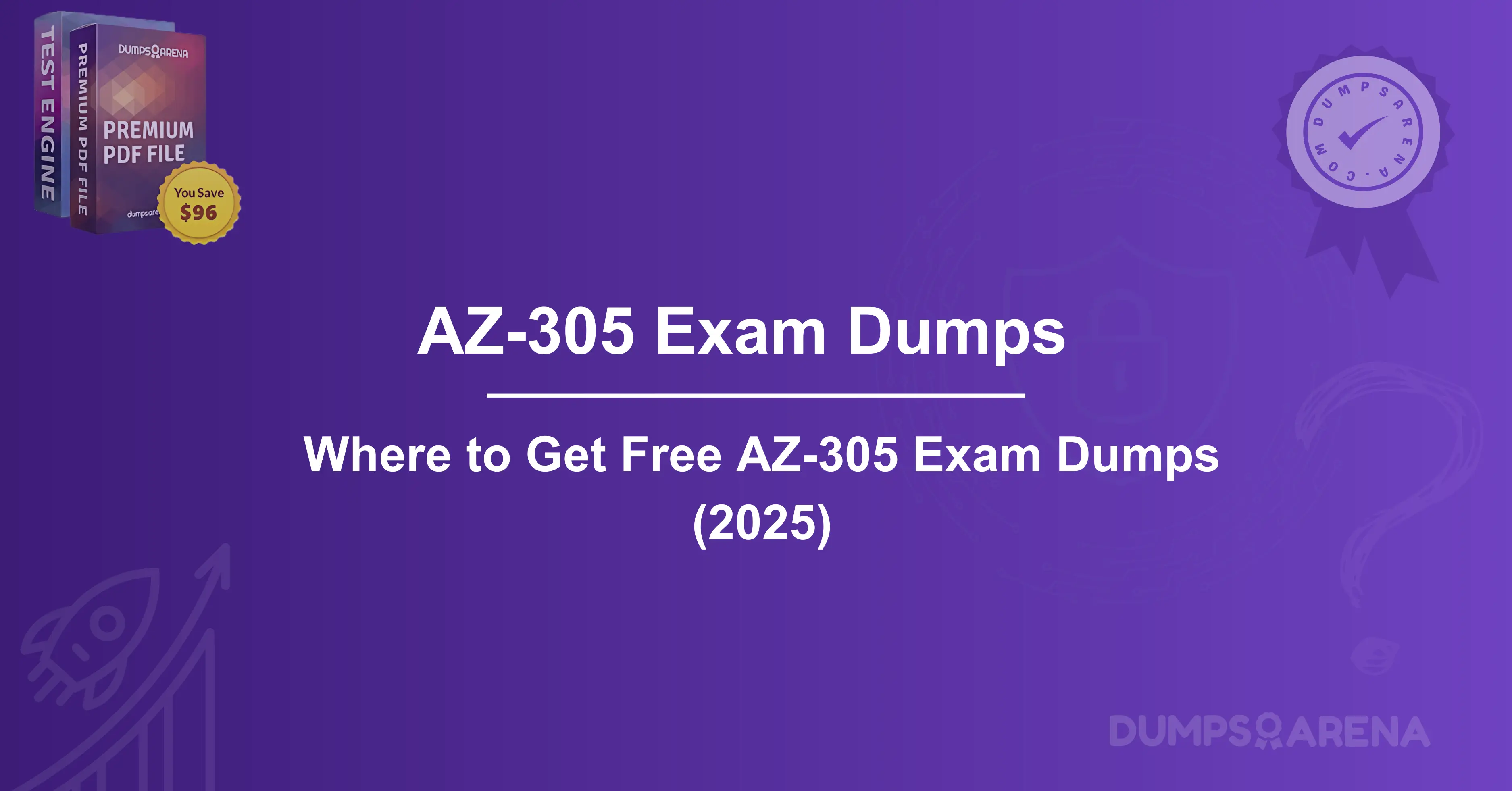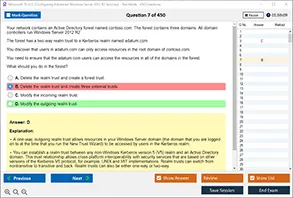Introduction to AZ-305 Exam
The Microsoft AZ-305: Designing Microsoft Azure Infrastructure Solutions exam is a certification test designed for Azure Solutions Architects. It validates the skills required to design cloud and hybrid solutions that run on Microsoft Azure, including compute, network, storage, security, and governance.
This exam is an advanced-level test, often taken after AZ-104 (Microsoft Azure Administrator) or alongside AZ-303/AZ-304 (before they were retired). Passing AZ-305 earns you the Microsoft Certified: Azure Solutions Architect Expert certification.
Who Should Take AZ-305?
- Azure Solutions Architects
- Cloud Consultants
- IT Professionals designing Azure infrastructure
- DevOps Engineers involved in deployment and governance
Exam Format
- Duration: 180 minutes
- Number of Questions: 40-60 (multiple-choice, case studies, drag-and-drop)
- Passing Score: 700/1000
- Cost: $165 USD
2. Exam Objectives and Skills Measured
The AZ-305 Exam Dumps tests your ability in the following domains:
| Domain | Weight (%) |
| Design identity, governance, and monitoring solutions | 25-30% |
| Design data storage solutions | 25-30% |
| Design business continuity solutions | 10-15% |
| Design infrastructure solutions | 25-30% |
Each domain requires deep knowledge of Azure services, best practices, and architectural principles.
3. Designing Identity, Governance, and Monitoring Solutions
A. Azure Active Directory (Azure AD) Design
- Hybrid Identity Solutions: Azure AD Connect, Pass-through Authentication, Federation (AD FS)
- Azure AD B2B & B2C: Multi-tenant and customer identity management
- Conditional Access Policies: MFA, device compliance, location-based access
B. Role-Based Access Control (RBAC) & Governance
- Custom Roles vs. Built-in Roles
- Azure Policy & Blueprints: Compliance enforcement
- Management Groups: Hierarchical organization of subscriptions
C. Monitoring & Logging
- Azure Monitor: Metrics, Log Analytics, Alerts
- Azure Sentinel: SIEM for threat detection
- Azure Service Health & Advisor
4. Designing Data Storage Solutions
A. Choosing the Right Storage Solution
| Storage Type | Use Case |
| Blob Storage | Unstructured data (images, logs) |
| Azure Files | SMB/NFS file shares |
| Azure Disk Storage | VM disks (SSD, HDD) |
| Azure Table Storage | NoSQL key-value storage |
| Azure Cosmos DB | Globally distributed NoSQL |
B. Backup & Disaster Recovery
- Azure Backup: VM, SQL, file-level backup
- Azure Site Recovery (ASR): Cross-region failover
C. Data Migration Strategies
- Azure Data Box: Large offline transfers
- Azure Migrate: VM and database assessments
5. Designing Business Continuity Solutions
A. High Availability (HA) Strategies
- Availability Sets & Zones
- Load Balancers (ALB, SLB, GWLB)
- Auto-scaling (VMSS, AKS clusters)
B. Disaster Recovery (DR) Planning
- RPO (Recovery Point Objective) & RTO (Recovery Time Objective)
- Multi-region deployments
C. Failover & Failback Testing
- Azure Site Recovery (ASR) drills
6. Designing Infrastructure Solutions
A. Compute Solutions
- Virtual Machines (VMs): Series selection (D, E, F, etc.)
- Azure Kubernetes Service (AKS): Container orchestration
- Azure App Service: PaaS for web apps
B. Networking Solutions
- Virtual Networks (VNet): Subnets, peering
- Azure Firewall & NSGs
- ExpressRoute vs. VPN Gateway
C. Hybrid & Multi-cloud Strategies
- Azure Arc: Managing on-prem & multi-cloud resources
- Azure Stack HCI: Hyper-converged infrastructure
7. Best Practices for AZ-305 Exam Preparation
Official Microsoft Learning Paths (Microsoft Learn)
Hands-on Labs (Azure Portal, GitHub scenarios)
Practice Tests (MeasureUp, Whizlabs)
Study Groups & Forums (Reddit, TechCommunity)
8. Are AZ-305 Exam Dumps Reliable?
Risks of Using Dumps:
- Violation of Exam Policy (Microsoft bans dump users)
- Outdated/Incorrect Answers
- No Conceptual Understanding
Better Alternatives:
- Microsoft Docs
- Instructor-led Training (Pluralsight, Udemy)
9. Alternative Study Resources
Books:
- Exam Ref AZ-305 (Microsoft Press)
- Azure Architecture Handbook
Video Courses:
- A Cloud Guru
- LinkedIn Learning
10. Conclusion
The AZ-305 exam requires a deep understanding of Azure architecture principles. While exam dumps may seem tempting, they are risky and unethical. Instead, use official Microsoft resources, hands-on practice, and structured courses to ensure success.
By mastering identity governance, storage, business continuity, and infrastructure design, you’ll be well-prepared to pass the AZ-305 and earn your Azure Solutions Architect Expert certification.
Start your Azure journey today!
Cost-Effective Strategies for Designing Microsoft Azure Infrastructure Solutions
The "Exam Designing Microsoft Azure Infrastructure Solutions Using Microsoft Azure IoT Developer" focuses on designing secure, scalable Azure IoT solutions. It covers IoT Hub, edge computing, data processing, and integration with Azure services. Ideal for IoT developers and architects. For study resources, check Dumpsarena for reliable exam dumps and guides.
Get Accurate & Authentic 500+ AZ-305 Exam Dumps
Question 1: Choosing the Right Compute Service
Scenario: A company needs to deploy a stateless, containerized application that requires automatic scaling and minimal management overhead. Which Azure compute service is the best choice?
A) Azure Virtual Machines
B) Azure Kubernetes Service (AKS)
C) Azure App Service (with containers)
D) Azure Container Instances
Question 2: High Availability for Azure SQL Database
Scenario: Your application requires an Azure SQL Database with 99.99% SLA and automatic failover in case of a regional outage. Which deployment option should you use?
A) Single Database (Basic Tier)
B) Hyperscale (Serverless)
C) Business Critical Tier (Zone-Redundant)
D) General Purpose Tier (Standard)
Question 3: Storage Solution for Big Data Analytics
Scenario: A company needs a low-cost, highly scalable storage solution for big data analytics with support for hierarchical namespace. Which Azure storage service should they use?
A) Azure Blob Storage (Standard)
B) Azure Data Lake Storage Gen2
C) Azure Files (Premium)
D) Azure Table Storage
Question 4: Disaster Recovery Strategy
Scenario: You need to ensure RPO < 15 minutes and RTO < 1 hour for critical VMs in Azure. Which solution provides the best balance of cost and compliance?
A) Azure Backup (Vault-based)
B) Azure Site Recovery (ASR)
C) Geo-Redundant Storage (GRS)
D) Manual VM snapshots
Question 5: Network Security for PaaS Services
Scenario: A company wants to restrict access to their Azure PaaS services (e.g., Azure SQL, Storage) to only their corporate network. What is the most secure solution?
A) Network Security Groups (NSGs)
B) Azure Private Link
C) Azure Firewall
D) Service Endpoints




